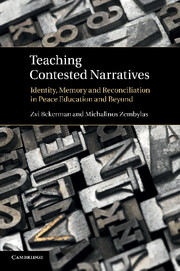Book contents
- Frontmatter
- Contents
- Acknowledgments
- Permissions
- Part I Introduction and theoretical underpinnings
- Part II Living and teaching contested narratives
- Part III Mourning, forgiveness and reconciliation
- Part IV Conclusions
- 11 Becoming critical design experts in schools
- 12 Memory and forgetting
- 13 De-essentializing identity
- 14 Designing different paths for reconciliation pedagogies
- References
- Index
11 - Becoming critical design experts in schools
Published online by Cambridge University Press: 05 December 2011
- Frontmatter
- Contents
- Acknowledgments
- Permissions
- Part I Introduction and theoretical underpinnings
- Part II Living and teaching contested narratives
- Part III Mourning, forgiveness and reconciliation
- Part IV Conclusions
- 11 Becoming critical design experts in schools
- 12 Memory and forgetting
- 13 De-essentializing identity
- 14 Designing different paths for reconciliation pedagogies
- References
- Index
Summary
Education has for too long been discussed in the abstractions of theory and not enough has been done to understand its practice. Without a basic understanding of what gets done in educational activities, be these peace educational activities or other, we do not believe any serious discussion on education can be held. While in general education some progress has been done and research on actual classroom realities has been published, peace education lags far behind. In Parts II and III we travelled the world of educational practices, we dealt with the micro, the actual doings as these get done in the educational spheres we have researched. We have also analyzed in detail some of the teachers’ ideas regarding concepts that are central to peace education, and discussed how these ideas are manifested in pedagogical practices. Yes, we are committed to understanding the world in detail, and details are what we have tried to bring to the table, and yet we are not naive. Details, the details of small pedagogical practices, are enacted in wider contexts which evolve in specific historical conditions. Thus we have no choice now that we are approaching the end of this book but to widen the perspective, try to once again situate what has been said back into wider horizons, for it is this continuous dialogue between the macro and the micro that is the one (only) thing which might allow for serious considerations as to how to bring about change (change with a small “c,” for that is the most we can expect when considering the complexity of the issues we have raised).
Details might help correct some of the pedagogical practices implemented which have been shown to be dubious and/or problematic in the context of our research sites. No less importantly, details allow us to understand how the macro-level picture (i.e., the one usually discussed in educational policy) becomes organized. This shift from the micro to the macro level is not unproblematic. Yet, if it is not done – that is, if the meaning of peace education is not extended from the small details to the big issues – then peace education will remain trapped in a number of problematic reified categories.
- Type
- Chapter
- Information
- Teaching Contested NarrativesIdentity, Memory and Reconciliation in Peace Education and Beyond, pp. 185 - 195Publisher: Cambridge University PressPrint publication year: 2011



